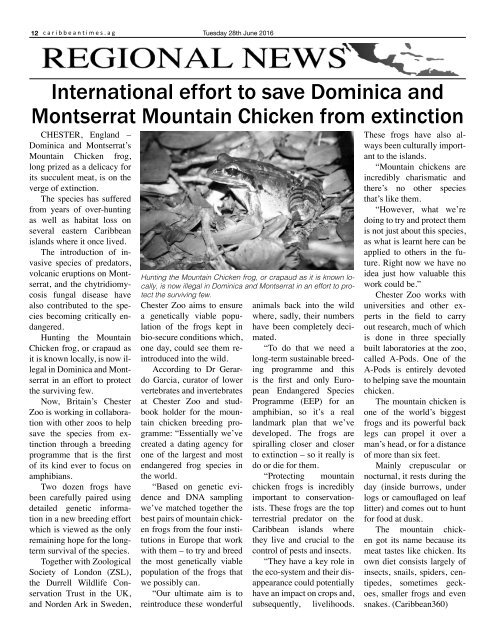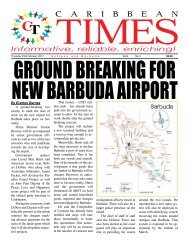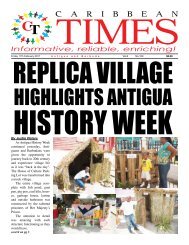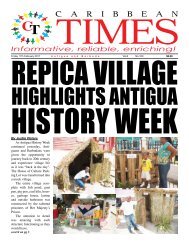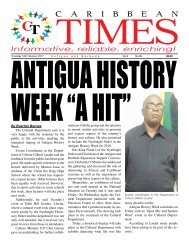Caribbean Times 39th Issue - Tuesday 28th June 2016
Caribbean Times 39th Issue - Tuesday 28th June 2016
Caribbean Times 39th Issue - Tuesday 28th June 2016
Create successful ePaper yourself
Turn your PDF publications into a flip-book with our unique Google optimized e-Paper software.
12 c a r i b b e a n t i m e s . a g<br />
<strong>Tuesday</strong> <strong>28th</strong> <strong>June</strong> <strong>2016</strong><br />
International effort to save Dominica and<br />
Montserrat Mountain Chicken from extinction<br />
CHESTER, England –<br />
Dominica and Montserrat’s<br />
Mountain Chicken frog,<br />
long prized as a delicacy for<br />
its succulent meat, is on the<br />
verge of extinction.<br />
The species has suffered<br />
from years of over-hunting<br />
as well as habitat loss on<br />
several eastern <strong>Caribbean</strong><br />
islands where it once lived.<br />
The introduction of invasive<br />
species of predators,<br />
volcanic eruptions on Montserrat,<br />
and the chytridiomycosis<br />
fungal disease have<br />
also contributed to the species<br />
becoming critically endangered.<br />
Hunting the Mountain<br />
Chicken frog, or crapaud as<br />
it is known locally, is now illegal<br />
in Dominica and Montserrat<br />
in an effort to protect<br />
the surviving few.<br />
Now, Britain’s Chester<br />
Zoo is working in collaboration<br />
with other zoos to help<br />
save the species from extinction<br />
through a breeding<br />
programme that is the first<br />
of its kind ever to focus on<br />
amphibians.<br />
Two dozen frogs have<br />
been carefully paired using<br />
detailed genetic information<br />
in a new breeding effort<br />
which is viewed as the only<br />
remaining hope for the longterm<br />
survival of the species.<br />
Together with Zoological<br />
Society of London (ZSL),<br />
the Durrell Wildlife Conservation<br />
Trust in the UK,<br />
and Norden Ark in Sweden,<br />
Hunting the Mountain Chicken frog, or crapaud as it is known locally,<br />
is now illegal in Dominica and Montserrat in an effort to protect<br />
the surviving few.<br />
Chester Zoo aims to ensure<br />
a genetically viable population<br />
of the frogs kept in<br />
bio-secure conditions which,<br />
one day, could see them reintroduced<br />
into the wild.<br />
According to Dr Gerardo<br />
Garcia, curator of lower<br />
vertebrates and invertebrates<br />
at Chester Zoo and studbook<br />
holder for the mountain<br />
chicken breeding programme:<br />
“Essentially we’ve<br />
created a dating agency for<br />
one of the largest and most<br />
endangered frog species in<br />
the world.<br />
“Based on genetic evidence<br />
and DNA sampling<br />
we’ve matched together the<br />
best pairs of mountain chicken<br />
frogs from the four institutions<br />
in Europe that work<br />
with them – to try and breed<br />
the most genetically viable<br />
population of the frogs that<br />
we possibly can.<br />
“Our ultimate aim is to<br />
reintroduce these wonderful<br />
animals back into the wild<br />
where, sadly, their numbers<br />
have been completely decimated.<br />
“To do that we need a<br />
long-term sustainable breeding<br />
programme and this<br />
is the first and only European<br />
Endangered Species<br />
Programme (EEP) for an<br />
amphibian, so it’s a real<br />
landmark plan that we’ve<br />
developed. The frogs are<br />
spiralling closer and closer<br />
to extinction – so it really is<br />
do or die for them.<br />
“Protecting mountain<br />
chicken frogs is incredibly<br />
important to conservationists.<br />
These frogs are the top<br />
terrestrial predator on the<br />
<strong>Caribbean</strong> islands where<br />
they live and crucial to the<br />
control of pests and insects.<br />
“They have a key role in<br />
the eco-system and their disappearance<br />
could potentially<br />
have an impact on crops and,<br />
subsequently, livelihoods.<br />
These frogs have also always<br />
been culturally important<br />
to the islands.<br />
“Mountain chickens are<br />
incredibly charismatic and<br />
there’s no other species<br />
that’s like them.<br />
“However, what we’re<br />
doing to try and protect them<br />
is not just about this species,<br />
as what is learnt here can be<br />
applied to others in the future.<br />
Right now we have no<br />
idea just how valuable this<br />
work could be.”<br />
Chester Zoo works with<br />
universities and other experts<br />
in the field to carry<br />
out research, much of which<br />
is done in three specially<br />
built laboratories at the zoo,<br />
called A-Pods. One of the<br />
A-Pods is entirely devoted<br />
to helping save the mountain<br />
chicken.<br />
The mountain chicken is<br />
one of the world’s biggest<br />
frogs and its powerful back<br />
legs can propel it over a<br />
man’s head, or for a distance<br />
of more than six feet.<br />
Mainly crepuscular or<br />
nocturnal, it rests during the<br />
day (inside burrows, under<br />
logs or camouflaged on leaf<br />
litter) and comes out to hunt<br />
for food at dusk.<br />
The mountain chicken<br />
got its name because its<br />
meat tastes like chicken. Its<br />
own diet consists largely of<br />
insects, snails, spiders, centipedes,<br />
sometimes geckoes,<br />
smaller frogs and even<br />
snakes. (<strong>Caribbean</strong>360)


